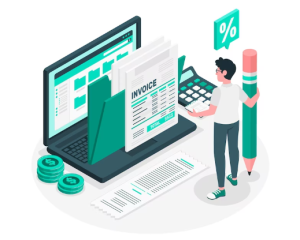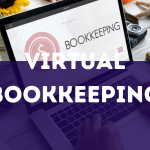Do I need a bookkeeper?
In the world of small business, managing finances is a critical aspect of success. Business owners often find themselves juggling various tasks, from marketing to operations, leaving little time for managing financial records. This raises an important question: “Do I need a bookkeeper?”
Hiring a bookkeeper can provide significant benefits to your business, ensuring accurate financial records, freeing up your time, and helping you make informed decisions. In this article, we will explore the role of a bookkeeper, discuss the reasons why you might need one, and address some common FAQs related to bookkeeping.

Why is Bookkeeping Important?
Before delving into whether you need a bookkeeper or not, let’s first understand why bookkeeping is important for businesses of all sizes.
Bookkeeping is the process of systematically recording financial transactions, including sales, expenses, and payments. It involves maintaining accurate and up-to-date financial records to track the flow of money in and out of your business.
Here are a few key reasons why bookkeeping is crucial:
- Financial Organization: Proper bookkeeping ensures that all your financial transactions are organized and well-documented, making it easier to analyze and understand your business’s financial health.
- Tax Compliance: Accurate and detailed financial records are essential for filing taxes correctly and avoiding potential penalties or audits.
- Business Insights: Bookkeeping provides valuable insights into your business’s financial performance, enabling you to identify trends, make informed decisions, and plan for the future.
- Lending and Investment: When seeking loans or investments, lenders and investors often require detailed financial statements. Well-maintained books increase your credibility and improve your chances of securing funding.
Now that we understand the importance of bookkeeping, let’s address the question: Do I need a bookkeeper?
Do I Need a Bookkeeper?
While the decision to hire a bookkeeper ultimately depends on the unique needs and circumstances of your business, there are several compelling reasons why you might benefit from their expertise. Consider the following scenarios:
Limited Accounting Knowledge
You’re a small business owner with little to no accounting background.
If crunching numbers and dealing with financial statements isn’t your forte, hiring a bookkeeper can be a smart move. They possess the necessary expertise to accurately record and categorize your financial transactions, ensuring compliance with accounting standards.
Time Constraints
You’re overwhelmed with multiple responsibilities and can’t dedicate enough time to bookkeeping.
Running a business involves wearing multiple hats, and dedicating time to meticulous bookkeeping can be challenging. By outsourcing this task to a bookkeeper, you can focus on core business activities, while ensuring your financial records are well-maintained.
Complex Financial Transactions
Your business deals with complex financial transactions, such as inventory management, payroll, or multiple revenue streams.
As your business grows, the complexity of your financial transactions increases. A bookkeeper can navigate these intricacies, ensuring that all financial activities are accurately recorded and appropriately categorized.
Financial Analysis and Reporting
You need in-depth financial analysis and regular reports to make informed business decisions.
Bookkeepers not only maintain financial records but also provide valuable insights through financial analysis and reporting. They can generate various financial reports, such as profit and loss statements, balance sheets, and cash flow statements, to help you assess the financial health of your business.
Scalability and Growth
Your business is experiencing rapid growth and needs a robust financial infrastructure.
When your business expands, it becomes crucial to have a solid financial infrastructure in place. A bookkeeper can help you establish systems and processes to accommodate growth, ensuring that your financial records are well-organized and scalable.
FAQs about Bookkeeping
- What services do bookkeepers provide?
Bookkeepers offer a range of services, including recording financial transactions, reconciling accounts, managing accounts payable and receivable, generating financial reports, and providing financial analysis. They can also assist with payroll processing, tax preparation, and ensuring compliance with financial regulations.
- How much does hiring a bookkeeper cost?
The cost of hiring a bookkeeper varies depending on factors such as the complexity of your financial transactions, the volume of transactions, and the level of expertise required. Bookkeepers may charge an hourly rate or a monthly fee. It is advisable to discuss the pricing structure and services with potential bookkeepers to find the best fit for your business.
- Can I handle bookkeeping on my own using accounting software?
While accounting software can streamline certain aspects of bookkeeping, it still requires a level of accounting knowledge and time commitment. Moreover, software cannot provide the expertise and insights that a skilled bookkeeper brings to the table. Hiring a bookkeeper ensures accuracy, compliance, and frees up your time to focus on growing your business.
- Should I hire an in-house bookkeeper or outsource bookkeeping services?
The decision to hire an in-house bookkeeper or outsource bookkeeping services depends on your business’s needs and resources. In-house bookkeepers offer the advantage of being physically present and readily available. On the other hand, outsourcing bookkeeping services provides access to a team of professionals with diverse expertise and potentially reduces costs. Consider factors such as budget, the complexity of your financial transactions, and the need for immediate assistance in making this decision.
- Can bookkeepers help with tax preparation?
Yes, bookkeepers can play a significant role in tax preparation. They ensure that your financial records are accurate and up-to-date, making the tax filing process smoother. Bookkeepers can collaborate with your accountant to provide the necessary financial statements and documentation required for tax purposes.
- Is bookkeeping only necessary for large businesses?
No, bookkeeping is essential for businesses of all sizes. Even small businesses or solopreneurs can benefit from accurate financial records and the insights provided by bookkeepers. Proper bookkeeping allows you to monitor cash flow, make informed decisions, and ensure compliance with financial regulations.
Conclusion
In conclusion, the question “Do I need a bookkeeper?” is an important one for any business owner to consider. While every business is unique and the decision ultimately depends on your specific circumstances, hiring a bookkeeper can offer numerous benefits. From ensuring accurate financial records and compliance with tax regulations to providing valuable financial analysis and freeing up your time, a bookkeeper can be a valuable asset to your business.
If you have limited accounting knowledge, time constraints, complex financial transactions, a need for financial analysis, or plans for scalability and growth, it may be wise to consider hiring a bookkeeper. They can handle the intricacies of bookkeeping, allowing you to focus on what you do best – running and growing your business.
Remember, bookkeeping is not just for large businesses; even small businesses and solopreneurs can benefit from professional bookkeeping services. By maintaining accurate financial records, you gain valuable insights into your business’s financial health and can make informed decisions to drive success.
So, do you need a bookkeeper? Assess your specific needs, evaluate the benefits discussed in this article, and consider the potential impact on your business’s financial management. Hiring a bookkeeper may be the key to maintaining financial organization, compliance, and unlocking the full potential of your business.


